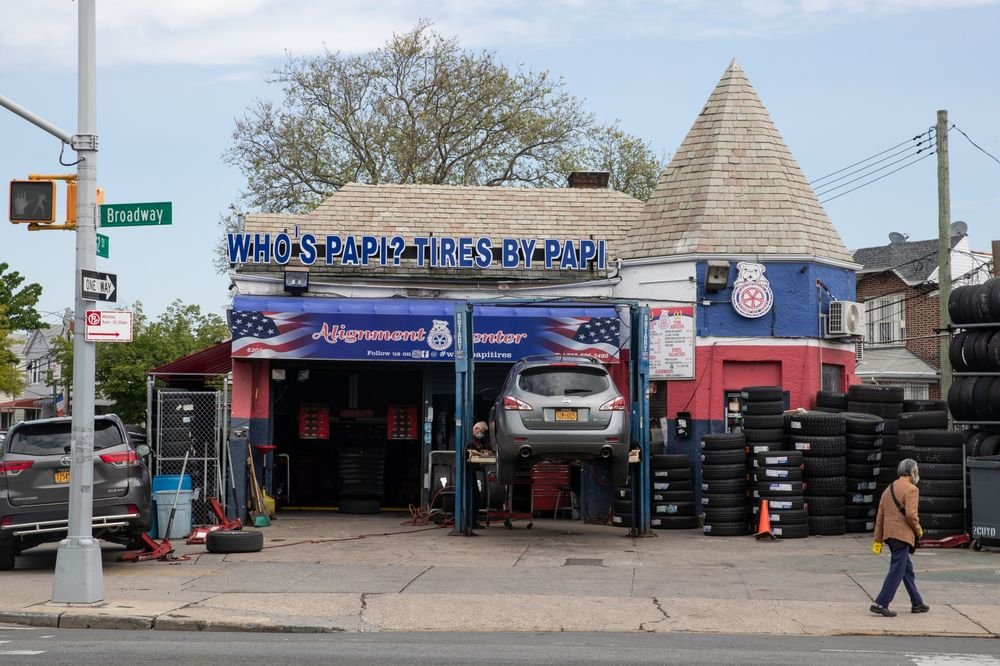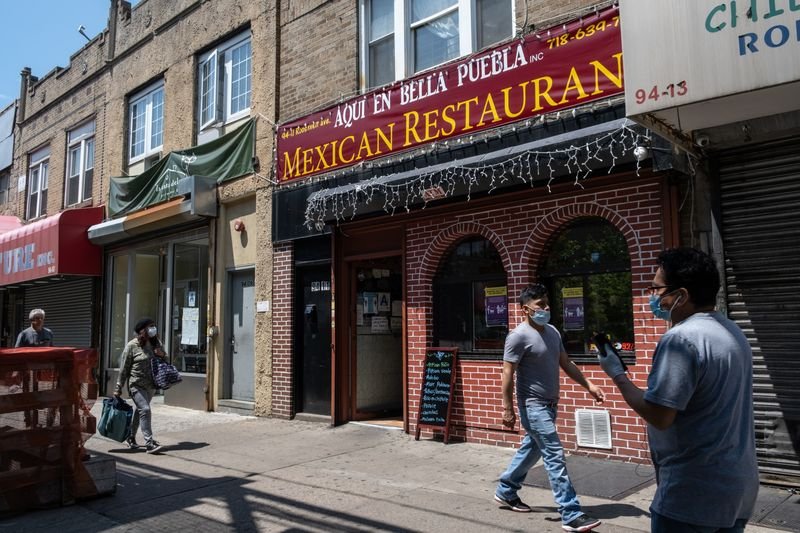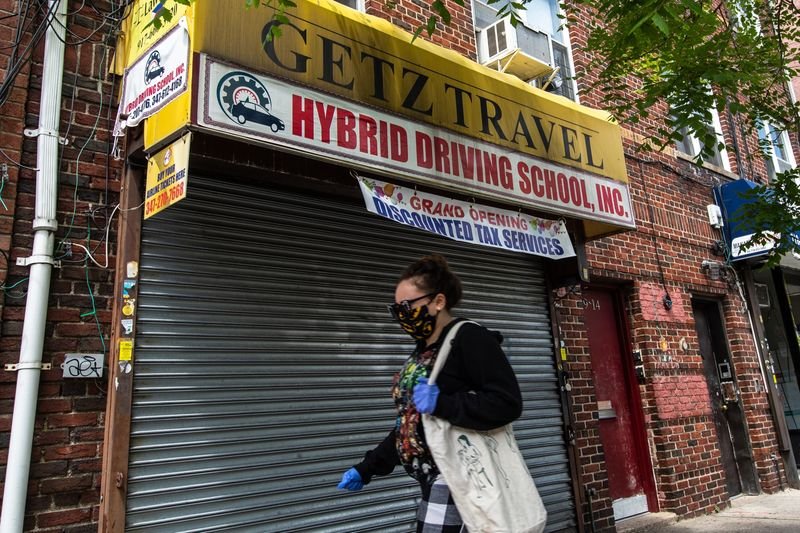Running a Business From the Sickbed at the Virus's Center in NYC
Hundreds of entrepreneurs, many of them women, are carrying on while the pandemic is raging in largely working-class Queens neighborhoods.
By Saijel Kishan
May 19, 2020, 6:00 PM GMT+6

Right in the epicenter of the global coronavirus pandemic, Maria Lugo has managed to keep her small business afloat. From her sickbed.
Lugo owns an auto repair shop in central Queens, one of the hardest-hit areas of New York City, which itself leads the U.S. in Covid-19 infections. She spent two days in the hospital after contracting the virus. Both her children and her husband also fell ill. Two other family members died from the disease.
“I thought I would lose my business,” said Lugo, 47. “It’s been tough, no doubt.”
Her resilience epitomizes the hardship of hundreds of small business owners who are trying to carry on while the virus is raging in the largely working-class Queens neighborhoods of Woodside, Jackson Heights and Elmhurst. Those entrepreneurs, many of them women, traditionally have little access to capital. They have struggled through the worst of the crisis without aid from the federal government, whose centerpiece $669 billion relief program for small firms has largely been beyond the reach of low-income areas that are shut out of the traditional financial system.
Weeks into the crisis, help might be on the way. Following outrage over how millions were doled out to high-profile restaurant chains, rules were changed to set aside aid money for organizations that provide financing to the nation’s most distressed communities. Microlenders such as Grameen America, a nonprofit started by Nobel Peace Prize Laureate Muhammad Yunus, have stepped in to secure relief loans for businesses such as Lugo’s. It’s funneling some cash to people who need it most.
Called in Sick
Lugo’s husband was the first to get ill in early March. Then it was Lugo and their daughter, followed by their son. By the time the city’s lockdown went into effect on March 22, some of Lugo’s employees had called in sick with coronavirus symptoms.
Lugo’s shop, Who’s Papi? Tires by Papi is located in a usually busy area of Woodside just off the flyover that connects Brooklyn with Queens. With streets emptied out, fewer cars, taxis and trucks needed work, and revenue slumped 80%.
“All the bills I faced were going through my mind,” Lugo said. That included $60,000 in monthly costs including taxes, insurance and keeping an expensive inventory of tires.
Lugo laid off four of her 10 employees, leaving a smaller crew to man the premises while she was at home, ill.
The team, with whom Lugo held weekly Zoom meetings, serviced police vehicles and cars belonging to doctors who worked at the nearby Elmhurst hospital, one of the city hospitals that was swamped with patients suffering from the worst symptoms of Covid-19.
The main federal relief plan for U.S. small businesses, the Paycheck Protection Program, was designed to shore up owners like Lugo and her employees during the unprecedented health crisis.
But businesses need to apply for loans via approved lenders, who prioritized their existing customers, making the funds inaccessible to those who are locked out of conventional banking. After the first round of $349 billion ran out of money in 13 days, Congress set aside $30 billion for community development financial institutions that provide financial services in economically distressed areas. The average size of loans has dropped to about $71,000 from $206,000 during the first tranche.
Microlender Grameen America helped secure loans that averaged $4,000 in the second round, according to its president, Andrea Jung, the former chief executive officer of Avon Products Inc.
“Qualifying women entrepreneurs in our microloan program who would otherwise be left behind in the funding rounds have successfully submitted applications for PPP relief,” Jung said in an emailed statement.
That included Lugo, who received a $6,000 loan less than two weeks ago. She’s returned to her business after more than a month.
12-Hour Shifts
About a ten-minute drive east into Jackson Heights, with the number 7 subway line rumbling up on the elevated tracks, Vanessa Gil had worked 12-hour shifts at her family restaurant. Gil, who normally handled the administration of the business, was left to manage it alone after her parents and some workers fell sick, presumably with the coronavirus.
 The Aqui En Bella Puebla Mexican restaurant. Photographer: Jeenah Moon/Bloomberg
The Aqui En Bella Puebla Mexican restaurant. Photographer: Jeenah Moon/Bloomberg
At the end of each day, Gil creeps quietly into her home so as not to get her children’s attention in case they come running to greet her. She needs to sanitize and do a clothes change first. Her parents were quarantined in the basement of her home, where she lives with her husband, three children and sister.
During the first two weeks of the lockdown, business tumbled 40% at Aqui En Bella Puebla, a Mexican eatery that serves dishes such as pork ribs in red sauce and salted beef tostada. Gil had to lay off 10 employees.
“I thought we may have to close altogether,” said Gil, 30, who had monthly costs of as much as $18,000.
Gil applied for federal small business relief in the first round and is still waiting to hear back. In the meantime, Gil has been fulfilling takeout orders and delivering food platters at Elmhurst hospital. Both her parents have recovered and returned to the restaurant to work.
Credit Crunch
Before the pandemic struck the city, Guillerma “Gigi” Conde would be in her car navigating the streets of central Queens, teaching students how to drive.
The lockdowns brought Conde’s business to a complete halt, striking right at the start of the driving-instruction season that lasts through September. Her Hybrid Driving School has monthly costs of more than $9,000, including rent for premises where Conde teaches in class.
Conde, who didn't apply for federal relief because she doesn't have an existing lending relationship with a bank, is now getting help from Grameen America to secure financing. Though she negotiated a delay in rent payments and her business credit card, she faces a credit crunch.
“I was scared about my business but then I see everyone else is suffering,” Conde, 60, said. “I thought to myself, ‘you’re not alone, so relax.’”
 A pedestrian passes the closed Hybrid Driving School. Photographer: Jeenah Moon/Bloomberg
A pedestrian passes the closed Hybrid Driving School. Photographer: Jeenah Moon/Bloomberg
One of her friends – a nurse – had died from the virus, as did a member of her church, she said. Two other friends recovered.
Conde is working on ways to change her business. She’s offered driving instruction online, and is looking at expanding her virtual teaching.
“I want to be positive,” Conde said. “Learning to drive is like getting freedom.”
Source: https://www.bloomberg.com/news/articles/2020-05-19/coronavirus-running-a-small-business-in-the-epicenter?fbclid=IwAR065PobWK1s3KlznoCJQ4zK7Mi9FQM92AVig7H2JrWnnk-quIK2nTO8fUE
Related
Grameen Telecom Provides Healthcare Equipment to Hospitals Engaged in Corona Treatment in 7 Divisional Cities outside Dhaka

Grameen Telecom carries out its responsibility towards ensuring the health and safety of doctors and healthcare workers



